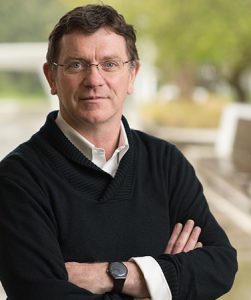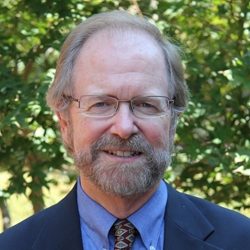 Raymond VanArragon is Professor of Philosophy at Bethel University. We invited him to answer the question “What does philosophy of religion offer to the modern university?” as part of our “Philosophers of Religion on Philosophy of Religion” series.
Raymond VanArragon is Professor of Philosophy at Bethel University. We invited him to answer the question “What does philosophy of religion offer to the modern university?” as part of our “Philosophers of Religion on Philosophy of Religion” series.
The question is, “What does philosophy of religion offer to the modern university?” I propose to answer by considering, as examples of the modern university, schools like my own: Christian liberal arts universities where the vast majority of students consider religion to be of significant and even supreme importance.
Philosophy of religion can benefit these students in a variety of ways, and in so doing can help Christian universities better fulfill their missions. To see this, let’s consider how two opposing types of students attending such schools might be impacted by taking a course in philosophy of religion.
The first type of student is the dogmatist. This student has hard and fast religious views, perhaps produced through a sheltered upbringing or a recent and enthusiastic conversion, where answers to profound questions are already settled and people who disagree are seen as ignorant or evil or both.
The dogmatist enrolls at a Christian university with settled beliefs on such topics as the existence of God (obvious), why God allows evil (to make possible our exercise of free will), who gets to go to heaven (people who believe more or less as they do), and much else besides. The fundamental point of this life, our dogmatist contends, is to determine one’s place in the afterlife; and those who do not embrace the Christian faith are going to hell.
Now these issues are in fact much more complex than the dogmatist may think. And there is great benefit to recognizing the complexity! That’s where philosophy of religion comes in. Philosophy of religion can help dogmatists recognize problems with their own views and reasonable features of opposing ones. It can help them begin to see that religious questions run extraordinarily deep, and that pat answers don’t end the discussion.
Return to the sample beliefs I just mentioned. Through study of philosophy of religion a dogmatist may learn that it is not so obvious or easy to prove that God exists, and hence that failing to believe may not be irrational. Perhaps the pervasive horror of this world’s evils cannot be understood purely as God’s way of creating an environment appropriate to the exercise of free will. Perhaps the existence of multiple religions, with their rich traditions and devout representatives, should render us less certain of God’s judgment on them and more inclined to emphasize what all believers have in common, even if there remains much on which we disagree.
The second type of student, opposite the dogmatist, can be called a cynic. Cynics are dismissive of religious belief and tend to feel superior to those who aren’t. Most students do not arrive at Christian universities in this state – they’d likely not attend if they were. Instead, they move in this direction upon exposure to readings that are part of a liberal arts curriculum, some of which contain challenges to religious belief. And cynics may think that their benighted classmates are simply not getting it; they aren’t opening their minds; they don’t recognize their own ignorance.
Philosophy of religion can have a similar impact on cynics, but from another direction. It can reveal that religious beliefs have something positive to be said for them – that there are reasons to believe, reasons put forward by highly intelligent people who have been exposed to those very same challenges but have nonetheless kept the faith. Further, cynics may be prone to assuming that the essence of religious faith is captured by the beliefs and posture of the dogmatist; and philosophy of religion makes clear that faith can be much richer than that.
Now, not only can study of philosophy of religion impact the beliefs of dogmatists and cynics in the ways just suggested. Just as importantly, it can produce an informed and virtuous kind of humility in students on the extremes as well as all those in between. Let me explain.
A central feature of philosophy of religion, and of philosophy more generally, is that while many arguments in the field are strong (and of course many are weak), relatively few are utterly conclusive. That is to say, for nearly any argument (for or against God’s existence, for or against our having freewill, and so on), rejecting it does not mean that you are stupid, dishonest, or in some other way a bad person.
It’s easy to see how recognizing this can promote humility. Philosophy of religion need not lead students to give up all their religious beliefs, but it hopefully will change how they assess those beliefs and the people who reject them. The fact that, as you see it, your beliefs about religion are true does not stem from your being so much smarter or rational or morally upright than everyone who disagrees with you. There must be some other explanation. Students who maintain Christian belief – even after careful reflection on arguments for and against – might come to see their grasp of the truth as a gracious gift, and thus as grounds for humble service rather than for pride. It is no coincidence, I think, that this is what Christianity has taught all along.
I teach philosophy at Bethel University, a Christian university one of whose stated goals is to produce students who are “world-changers and reconcilers.” The statement continues: “As we humbly and honestly engage with our own biases and preconceptions, we grow closer to understanding Christ’s infinite love and selfless mission of redemption.” Many Christian universities make similar statements. They desire, in short, to cultivate religious faith of the best kind.
That goal is elusive. Religion can be the source of so many vices – I’ve only hinted at a few of them. But study of philosophy of religion can counteract those vices. It can temper both dogmatism and cynicism. It can replace aggressive disagreement and debate with humility, with respect, and with a focus on the pursuit of common goals.
That’s what philosophy of religion offers today’s Christian liberal arts universities, an offering that is as important now as it has ever been.








